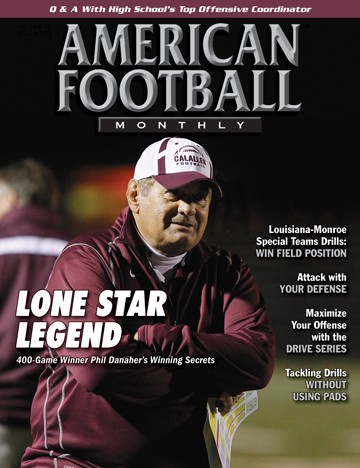AMERICAN FOOTBALL MONTHLY THE #1 RESOURCE FOR FOOTBALL COACHES
|
|
Article Categories
|
Coach to Coach: To Overcome Early Season Adversity, Become a Champby: Jared WoodSport Psychology Consultant© More from this issueEarly season adversity is common in football. Whether the adversity is a devastating loss, poor team chemistry, or another issue, a pre-planned process for improvement is necessary. Here are some suggestions for overcoming adversity and becoming a CHAMP.
Can Do
Adversity is often hard to overcome because individuals and teams stay focused on the problem for too long. A loss or setback always stings, and it should, but moving on and not looking back is essential for improvement. I like when teams have rules for limiting how long a loss (or a win for that matter) can be mourned (or celebrated). Move quickly to what you can do to improve for the upcoming game. Flood yourself and your team with can-do beliefs, words, images, and actions. Forget what not to do. You cannot get focused on what you donít want, so leave it behind....The full article can only be seen by subscribers.
Subscribe today!

|
|
|
NOT A SUBSCRIBER?
Subscribe
now to start receiving our monthly magazine PLUS get INSTANT
unlimited access to over 4000 pages of 100 percent football coaching
information, ONLY available at AmericanFootballMonthly.com!
|
|
|
HOME
|
MAGAZINE
|
SUBSCRIBE
|
ONLINE COLUMNISTS
|
COACHING VIDEOS
|
Copyright 2025, AmericanFootballMonthly.com
All Rights Reserved






